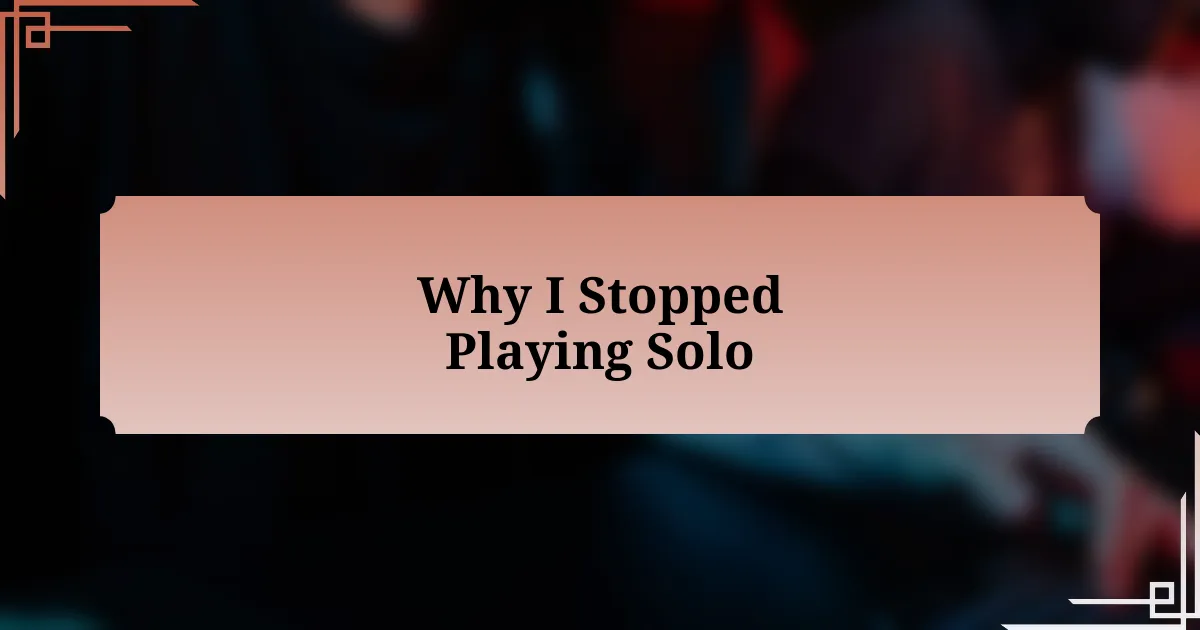Key takeaways:
- eSports combines competition, strategy, and community, offering players opportunities for skill development and social connections.
- Solo play enhances individual skills but can lead to isolation and limits growth without team support.
- Team gaming fosters camaraderie, diverse skill sets, and lasting friendships, improving the overall gaming experience.
- Transitioning from solo play to team play leads to more fulfilling gaming experiences through shared victories and support.
Author: Evelyn Hartley
Bio: Evelyn Hartley is an award-winning author known for her compelling narratives and richly drawn characters. With a background in psychology and literature, she weaves intricate tales that explore the complexities of human relationships and the intricacies of the human psyche. Her debut novel, “Whispers in the Dark,” was celebrated by critics and readers alike, earning her a dedicated following. Evelyn’s work has been featured in various literary journals and anthologies, and she frequently speaks at writing conferences and workshops. When she’s not writing, she enjoys hiking in the mountains and volunteering at her local animal shelter. She resides in Seattle with her two rescue dogs, Luna and Milo.
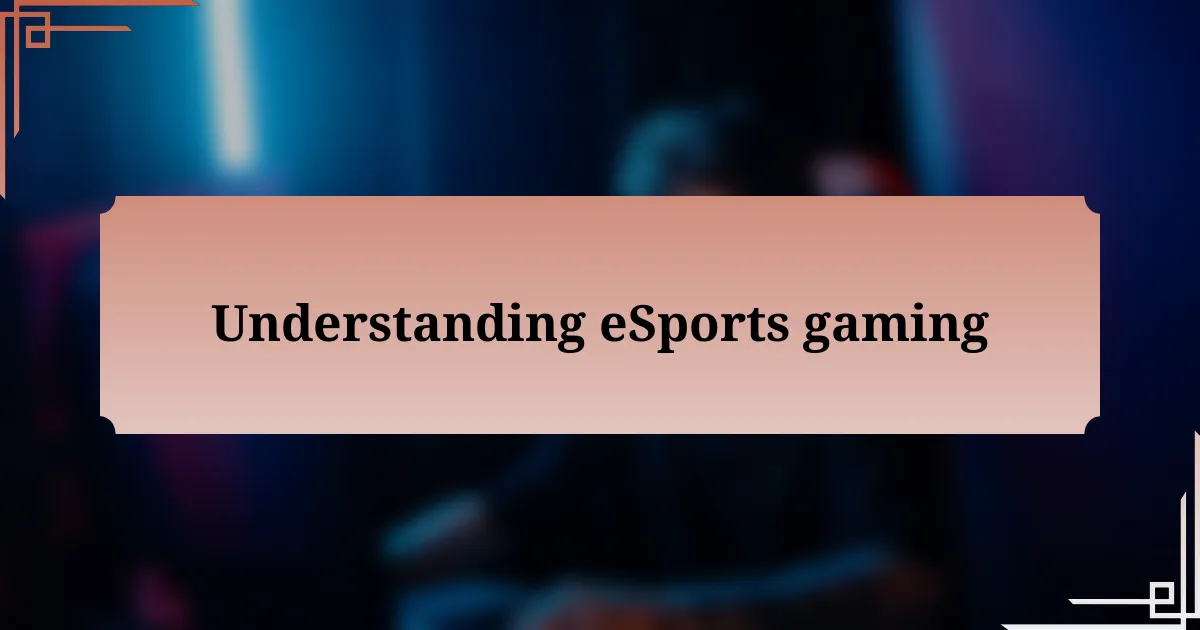
Understanding eSports gaming
eSports gaming is a vibrant and rapidly evolving field that combines competition, strategy, and community. I still remember the thrill of my first tournament; the adrenaline rush was like nothing I had ever experienced. Watching skilled players perform at such high levels made me realize how much dedication and practice goes into becoming a part of this world.
The camaraderie in eSports is also fascinating. Have you ever found yourself sharing tips with a fellow gamer or celebrating a victory together? Those moments forge connections that go beyond just winning or losing; they create a community where players support one another. It’s a unique environment where socializing is as crucial as gameplay.
Understanding the competitive landscape of eSports means acknowledging its diversity. From MOBAs to first-person shooters, each genre has its own set of strategies and fan bases. I recall diving into a new game and feeling overwhelmed at first, but with time, I discovered a rich tapestry of tactics and techniques that kept me engaged. It’s this complexity that draws many into the fold, challenging them to improve and connect with others along the way.
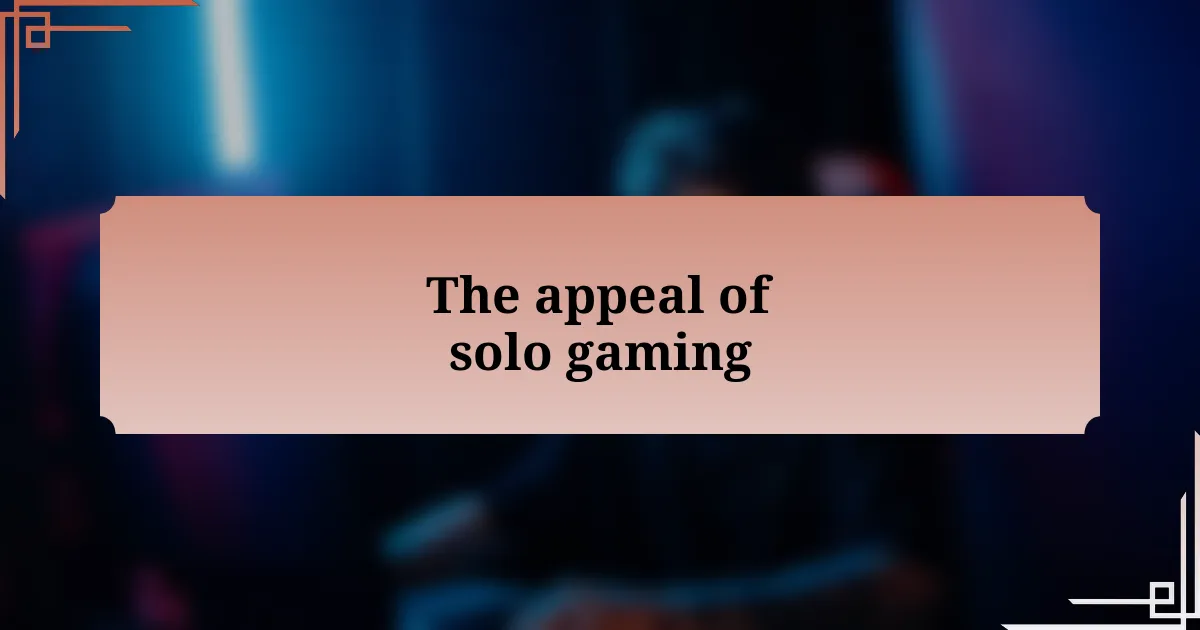
The role of solo play
Solo play serves as a unique experience within the eSports landscape, allowing gamers to hone their skills independently. I can still recall those countless hours I spent grinding through matches solo, focused on improving my mechanics. It was almost meditative to strategize alone, yet sometimes I found it isolating—missing out on the social interactions that come with team play.
Engaging in solo play also offers a space for self-discovery. Have you ever lost yourself in a game, only to emerge with a better understanding of your strengths and weaknesses? That’s precisely what I experienced during those solo sessions. They pushed my boundaries and taught me lessons about resilience and adaptability, but there were times when I longed for the collaborative energy of a team.
However, relying solely on solo play can limit a player’s growth. I often found myself stuck in a rut, unable to break through to the next level without the support and insights of other players. The experience taught me that while solo play sharpens individual skills, it’s the collective effort with teammates that truly elevates one’s game and fosters an environment of shared learning.
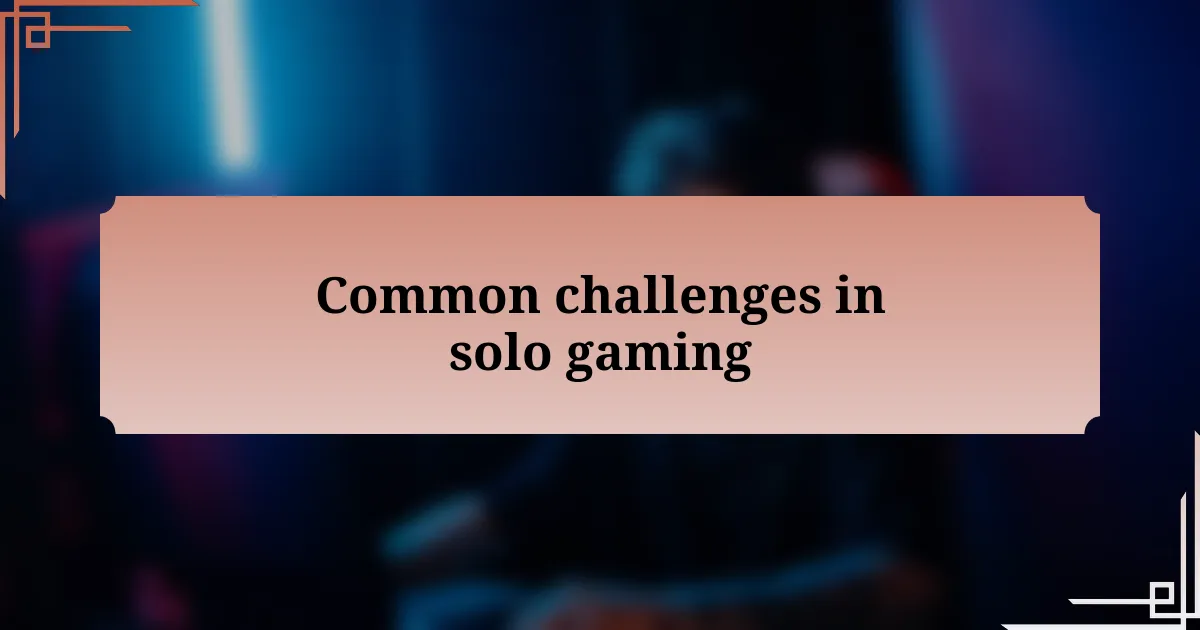
Challenges of solo gaming
Solo gaming presents some unique challenges that can be quite daunting. I remember moments where I was deeply engrossed in a match, only to be met with teammates who seemed unresponsive or disengaged. It made me question if it was just me doing something wrong or if the unpredictability of solo play would keep me from truly enjoying the game.
Another fundamental challenge of solo gaming is the emotional toll it can take. There were times I felt discouraged after a series of losses, with no one to share the frustration or triumphs with. It can be disheartening to face setbacks alone, leading to a sense of isolation that detracts from the joy of gaming. I often wondered: How different would my experience be if I had reliable teammates cheering me on during tough times?
Lastly, the lack of coordinated strategy in solo play often results in missed opportunities for growth. When I was attempting to learn new strategies or refine my approach, I found it hard to get valuable feedback. Have you ever sought guidance and found no one to turn to? In those moments, I wished for the camaraderie of a team to share insights and advice, making the journey not just about individual progress but shared success.
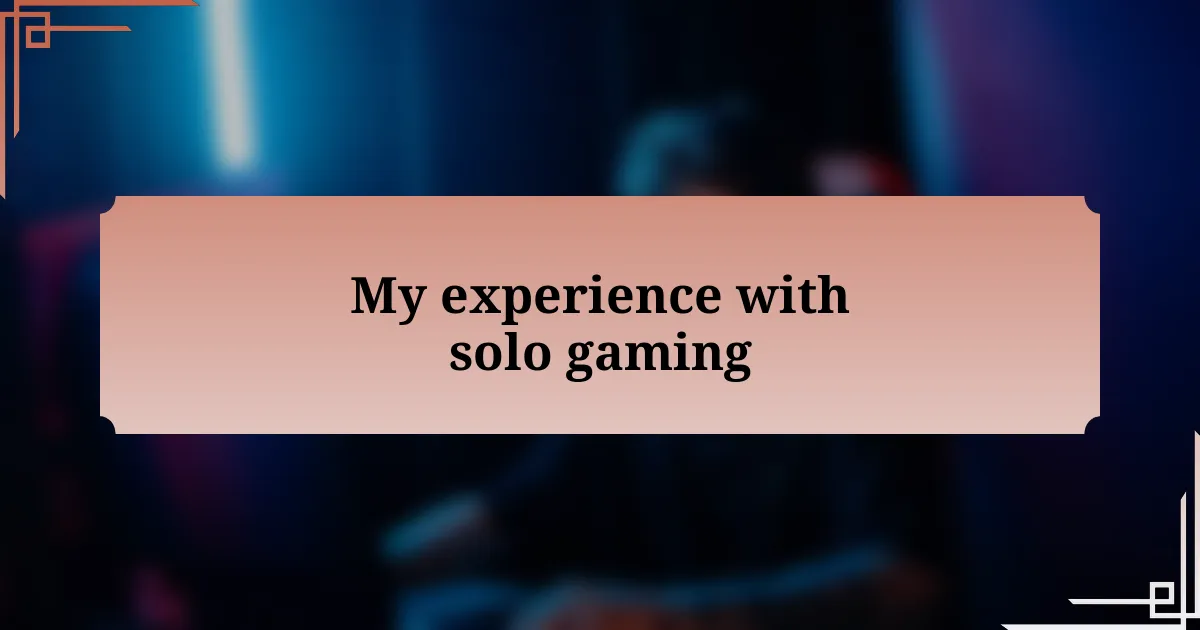
Benefits of team gaming
Team gaming offers a sense of camaraderie that solo play often lacks. I recall a particularly intense team match where we communicated strategies in real-time. The exhilaration of coordinating our efforts to outsmart opponents felt electrifying. Wouldn’t you agree that having friends by your side can amplify both victories and defeats?
Moreover, the diversity of skills within a team can lead to greater achievements. I remember playing a tactical shooter where my teammates had strengths in various areas—some excelled at sniping, while others were masters of close combat. This combination allowed us to tackle challenges from multiple angles, something I couldn’t achieve alone. How empowering is it to rely on each other’s expertise?
Lastly, team gaming fosters deeper connections and friendships. I have formed bonds with people I previously didn’t know, sharing laughs and frustrations that extend beyond the game itself. Have you ever felt that sense of belonging while playing collaboratively? It’s a reminder that gaming can be more than just competition; it can create a community filled with support and shared experiences.
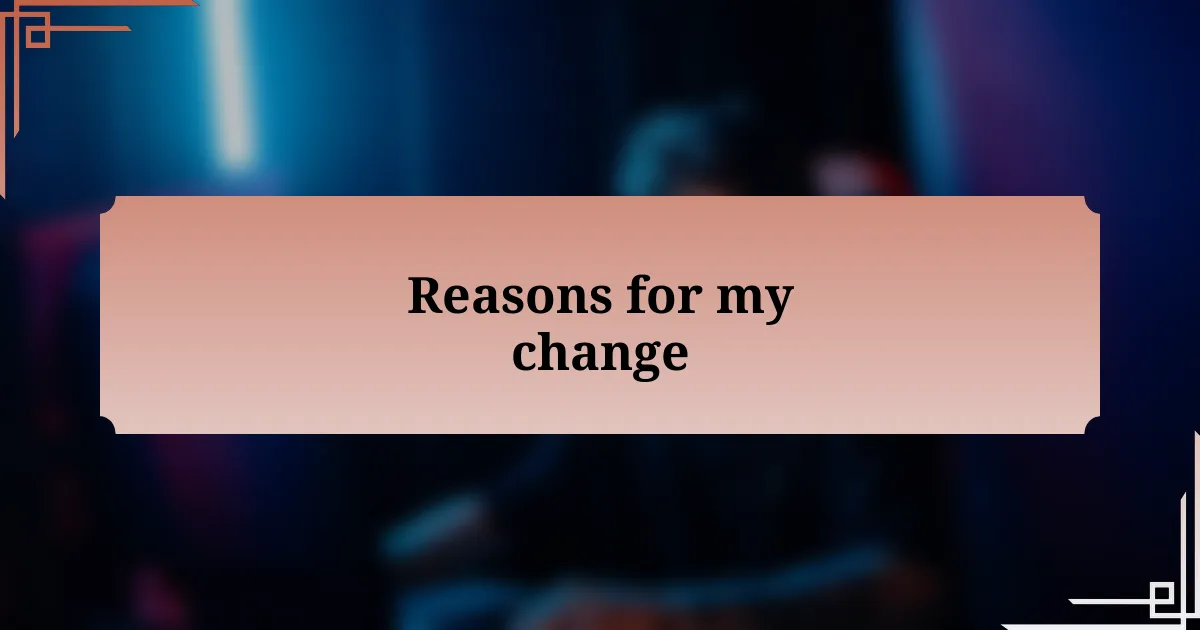
My personal gaming journey
Gaming has always been a significant part of my life, following a journey that began in my childhood. I remember those days spent alone in my room, lost in virtual worlds, thinking I was fully immersed. But over time, I realized that the thrill of victory felt hollow without someone to celebrate it with. Hasn’t everyone had that moment when you finally achieve something great, yet it seems less rewarding when there’s no one to share the excitement with?
As I transitioned from solo gaming to teaming up with friends, everything changed. One vivid memory stands out: during a crucial multiplayer match, I was struggling with my strategy and felt overwhelmed. A teammate stepped in, offering encouragement and tactical advice that shifted the game’s momentum in our favor. How incredible is it to witness a complete turnaround because of collaboration? That experience taught me the value of support and communication, transforming my gaming style forever.
Reflecting on my gaming journey, I’ve come to appreciate the richness of shared experiences. Each victory was punctuated with laughter and camaraderie, while the losses fostered understanding and growth among us. When I think back, it’s the memories of those late-night gaming sessions filled with banter that truly bring a smile to my face. Have you ever found that the connections made while gaming can transcend the virtual world? It’s this bonding that makes team gaming not just a pastime, but a part of who I am today.
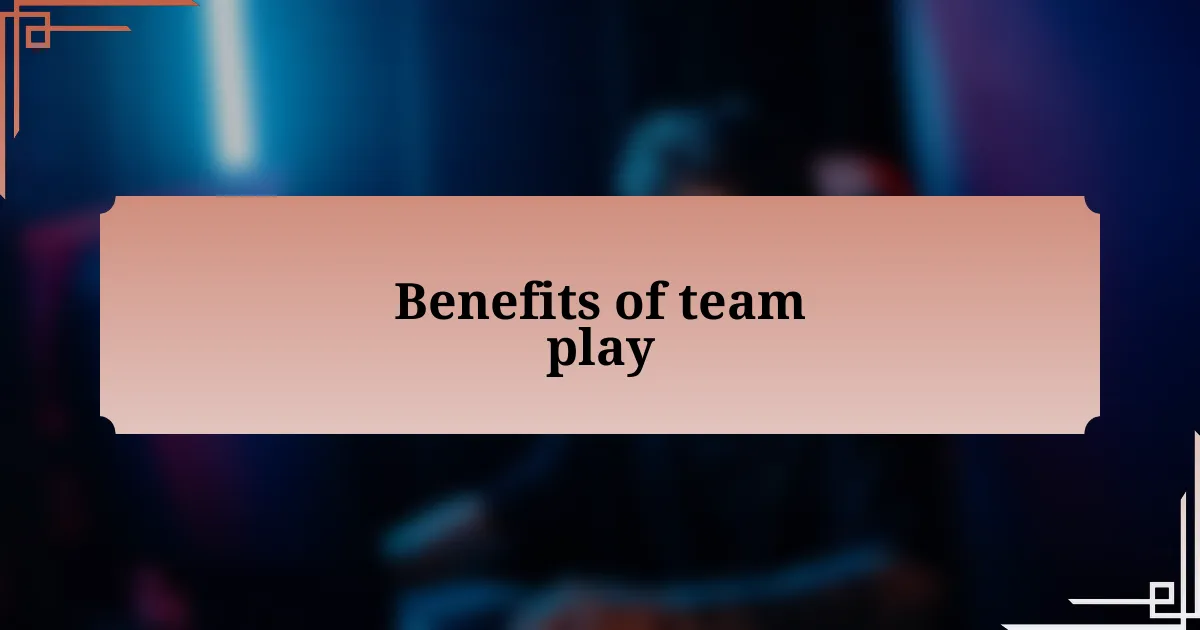
Reasons for quitting solo play
Quitting solo play for me was largely driven by a repetitive cycle that felt more like a task than a passion. I found myself grinding through matches, but the lack of dynamic interaction left me feeling drained and unfulfilled. Have you ever experienced that sense of isolation, even while playing a game? It’s disheartening; without others to share strategies or to bounce ideas off of, the thrill of the game diminishes significantly.
Another reason I moved away from solo play was the frustration of unpredictable matchmaking. I vividly recall one match where I was pitted against players with significantly higher skill levels. It felt like a one-sided battle, and instead of excitement, it just left me feeling defeated and resentful. Can you relate to the disappointment when your efforts seem futile? It’s in those moments I realized that playing with friends provided stability and a chance to genuinely enjoy the game, regardless of the outcome.
Lastly, the joy of shared experiences became a driving force behind my decision to quit solo gaming. I still remember a night when my friends and I pulled off an elaborate in-game stunt that took us hours to perfect. The laughter and excitement we shared in that moment were unforgettable. Have you ever felt that spark of joy that comes from teamwork? Leaving behind solo play has opened the door to a vibrant community where the highs feel higher and the lows are tackled together.

